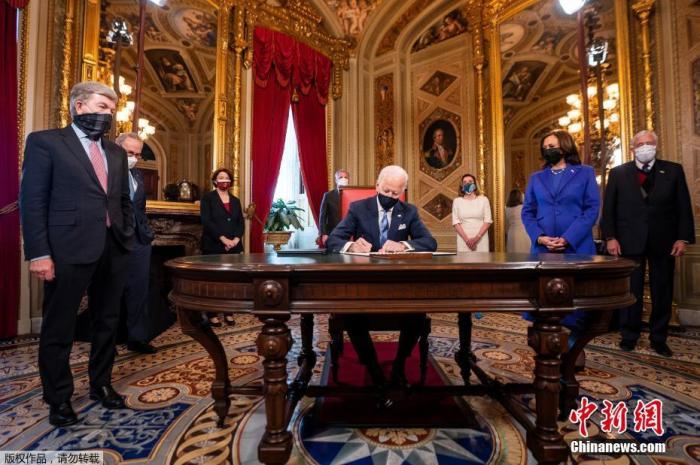China News Service, Washington, January 27 (Reporter Chen Mengtong) US President Biden signed a number of decree at the White House on the 27th to announce a series of policy measures to address climate change.
He stated that his government will put the response to the climate crisis at the center of US foreign policy and national security.
The picture shows the US President Biden and his wife leaving the Capitol after being sworn in.
"We can't wait any longer to deal with the climate change crisis. We can see clearly with our own eyes. We know from our bones that now is the time to act." It has been a week since Biden took office and he signed a name on the 27th. This is what the administrative order to "respond to the domestic and international climate change crisis" said.
The main title of the first part of the executive order stated that "putting the response to the climate crisis at the center of US foreign policy and national security."
Biden stated in the executive order that climate change considerations will be a "basic element" for his government in formulating foreign and national security policies.
The United States will cooperate with other countries through bilateral and multilateral mechanisms within the framework of the G-7 and the G-20, and will give priority to cooperation on climate change and clean energy.
Biden also announced that the United States will host the "Climate Change Summit" on "Earth Day" on April 22, and use this as an opportunity to reconvene the world's major economies to hold the Energy and Climate Change Forum.
The executive order also stated that the United States will immediately begin the process of formulating its nationally determined contributions in accordance with the Paris Agreement.
The United States will also immediately begin to formulate climate financing plans, using multilateral and bilateral channels to help developing countries achieve emission reduction targets.
Jody Freeman, a professor of environmental law at Harvard University and a former White House adviser on climate change, commented that Biden’s plan is an "action guidebook" for U.S. government agencies. "The message of these orders is,'We want Repeal the previous government's weakening of environmental protection policies'".
At noon on January 20, local time, Biden, a Democrat and President-elect of the United States, was formally sworn in as the 46th President of the United States on Capitol Hill.
The picture shows a series of documents signed by US President Biden after taking office.
In terms of domestic policy, Biden ordered the transformation of the US economy’s heavy dependence on fossil energy and encourages the development of clean energy.
The United States will suspend lease permits for oil and gas exploitation on federal land and provide subsidies to affected industries.
The Biden administration has also set a series of goals to combat climate change, including protecting 30% of the land and waters of the United States in the next 10 years, supporting the development of wind energy offshore the United States, and using electric vehicles for all federal government vehicles.
Biden stated that the United States plans to achieve zero carbon emissions in the power industry by 2035 and carbon neutrality by 2050.
Once the Biden administration's ambitious plan was put forward, it was opposed by Republicans in Congress and the petrochemical and energy business communities.
They believe that this series of measures will hurt the US economy and cause a large number of workers to lose their jobs.
The Associated Press pointed out that Biden's above-mentioned measures will bring political risks to his presidency and the Democratic Party.
Because once the United States significantly increases the use of clean energy, it will cause the states that rely on oil and coal mining as their main economic pillars to face unemployment.
Biden is also aware of the doubts and costs of implementing a "green economy."
He mentioned "employment" 15 times in the executive order and repeatedly emphasized that the employment opportunities created by the United States in the renewable energy and electric vehicle industries can offset losses in the oil, coal or natural gas industries.
He emphasized in his speech, "Today is the White House's'Climate Change Day' and the White House's'Employment Guarantee Day'." (End)

